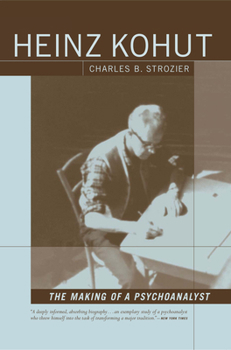Heinz Kohut: The Making of a Psychoanalyst
Select Format
Select Condition 
Book Overview
Heinz Kohut (1913-1981) stood at the center of the twentieth-century psychoanalytic movement. After fleeing his native Vienna when the Nazis took power, he arrived in Chicago, where he spent the rest of his life. He became the most creative figure in the Chicago Institute for Psychoanalysis, and is now remembered as the founder of 'self psychology, ' whose emphasis on empathy sought to make Freudian psychoanalysis less neutral. Kohut's life invited complexity. He obfuscated his identity as a Jew, negotiated a protean sexuality, and could be surprisingly secretive about his health and other matters. In this biography, Charles Strozier shows Kohut as a paradigmatic figure in American intellectual life: a charismatic man whose ideas embodied the hope and confusions of a country still in turmoil. Inherent in his life and formulated in his work were the core issues of modern America. The years after World War II were the halcyon days of American psychoanalysis, which thrived as one analyst after another expanded upon Freud's insights. The gradual erosion of the discipline's humanism, however, began to trouble clinicians and patients alike. Heinz Kohut took the lead in the creation of the first authentically home-grown psychoanalytic movement. It took an emigre be so distinctly American. Strozier brings to his telling of Kohut's life all the tools of a skillful analyst: intelligence, erudition, empathy, contrary insight, and a willingness to look far below the surface.
Format:Paperback
Language:English
ISBN:1590511026
ISBN13:9781590511022
Release Date:April 2004
Publisher:Other Press (NY)
Length:495 Pages
Weight:1.66 lbs.
Dimensions:1.0" x 6.1" x 9.0"
Customer Reviews
3 ratings
Kohut and Judaism
Published by Thriftbooks.com User , 16 years ago
As an analyst, can one espouse a therapeutic modality (self-psychology) if the founder is an individual clearly in conflict and denial, as Kohut was, vis-a-vis his Judaism? My answer is no! Even though he was elected president of the American Psychoanalytic Association, the widespread opinion was that he suffered a narcissitic personality disorder. His narcissistic rage was clearly most evident in his projecting of total hatred onto anything remotely connected with his Jewishness. Two of the most telling incidents in Strozier's book is when Kohut went to lunch in a kosher delicatessen with Paul Ornstein, one of his disciples(with a rabbinic background), whose analyst wife is an Auschwitz survivor. Kohut purposely ordered a ham and cheese sandwich with a glass of milk, which had the effect of humiliating not only the waiter, but both Ornsteins. Is this an individual whose philosophy one wants to follow? It was reported in Martin Bergmann and Milton Jucovy's book "Generations of the Holocaust" that Kohut's treatment of his patient, Mr. A, who had to flee the Nazis in Germany, only focussed on the patient's structural deficit. Kohut saw no connection between the child being a Holocaust survivor and his psychopathology. Is this characteristic of the empathy so widely touted as being practiced by "self-psychology"? Otherwise, Strozier's biography is interesting, although it gets bogged down in theoretical dogma, and could have used some tighter editing of chapters.
180 N. Michigan Avenue redux
Published by Thriftbooks.com User , 18 years ago
For those who knew in vivo many of the characters forming the cast of this epic, reading the book would have an illusory experience of deja vu. Kohut and many of the members of the Institute for Psychoanalysis in Chicago had the courage to launch a new system that shook the freudian orthodoxy in its very foundations --- while in so doing managing to enrich this, until then, fading system. I highly recommend this biography as a fair and just assessment of the man (and of the men and women that formed his inner circle) and of his grasp on narcissim and empathy. Kudos to Strozier!
a deep drink from an unusual well.
Published by Thriftbooks.com User , 24 years ago
A biography of Heinz Kohut who was at the center of the 20th century American psychoanalytic movement. After the Nazis took over Vienna he fled to Chicago, where he spent the rest of his life & is now remembered as the founder of "self psychology."That said: you have got to have an appetite for exploration into the deep recesses of our psychology & the ways we live our lives.This biography will appeal to those who have lived through the same era as Heinz Kohut & who have encountered the less authoritarian & more compassionate school of psychoanalysis now known as self-psychology which made major changes in reformatting the revered Freudian theory & practice.A deep drink from an unusual well - well-written, if somewhat dense in places. Well worth it, however, if you are at all interested in the signs of intelligent life during America's post WWII years which led up to the human potential movement.I'm amazed that I read it because my mind was boggled by the subject & the author! What did I learn? Zounds - it'll take me years to process a fraction of what has been brought to the surface!






